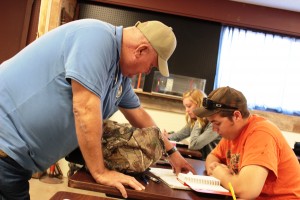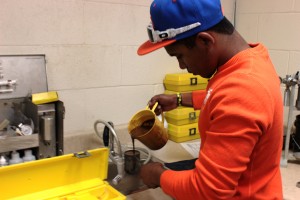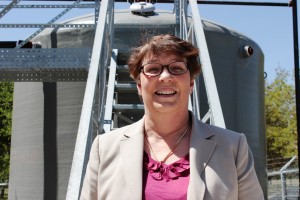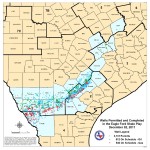The Shale Boom: Small Texas Towns, Big Paychecks
Students from small towns in Texas are filling up community college classes that have titles like “Drilling” and “Well Completions.”

Dave Fehling / StateImpact
At Coastal Bend College, oil & gas instructor Roy Coley with students Kollin Harless and Nicole Burks
At Coastal Bend College in Beeville in the heart of the Eagle Ford Shale, just 46 students enrolled for petroleum training courses in 2008. Last year, there were 1,086. Many of the students are lured by promises of salaries that used to be found mostly in bigger cities.
“There’s so many more opportunities for jobs now in all these little small towns around here,” said Kollin Harless who’s from Three Rivers, population 1,834. He’s studying “mud engineering” to learn how to ensure that drilling fluid—or mud as it’s called—is properly formulated and injected at a drilling site. He expects an annual starting salary in the neighborhood of $60,000.
One of his classmates, Nicole Burks, started college with an entirely different career goal.
“I was actually in nursing school before this, and I just wasn’t feeling it,” said Burks. She too wants to specialize in drilling mud with hopes of going into sales for an oil field services company.
Data from the Texas Railroad Commission show that in 2008, the Eagle Ford region of South Texas had a mere 100 or so wells producing oil and gas. By 2012, the number of producing wells was exceeding 2,000.

Dave Fehling / StateImpact
Student Tyrel Brown analyzes drilling mud in lab at Coastal Bend College
According to an economic impact study just released by the University of Texas at San Antonio’s Center for Community and Business Research, the Eagle Ford Shale last year poured $89 billion dollars into the South Texas economy, supporting 127,000 jobs.
It would support even more if Laura Fischer could just find enough qualified people.
“Next to impossible,” says Fischer when asked how hard it is to find new hires. Fischer and her husband own a small petroleum engineering firm in Beeville, 100 miles south of San Antonio.
“Finding engineers to come to Beeville is sometimes difficult. Youngsters coming out of school want to be in a city. They don’t want to be in a rural area even though we’re right in the middle of (the Eagle Ford),” said Fischer.
Fischer says the competition for workers makes it hard for their company to hold onto gaugers: technicians who check completed wells and who the company pays a yearly salary of up to $40,000. Overall, Fischer says her company is paying 25-30% more now in wages than a few years ago.

Dave Fehling / StateImpact
Laura Fischer of R.W. Dirks Petroleum Engineer Inc.
“But that’s OK. We’re making more money too. And if we can get the skilled labor, I’m willing to pay more for it,” Fischer told StateImpact.
With the state legislature having cut education funding including to community colleges, Coastal Bend College president Beatriz Espinoza said they’re trying to keep up with the surge in students by being creative: reducing costs through the streamlining of courses, applying for federal grants, and persuading big oil companies including ConocoPhillips and Marathon to donate specialized and expensive oil field equipment for students to use.
And like most state educators, she hopes lawmakers restore what was cut.
“We have been telling them that we need our funding back, and they are working with us on some of that,” said Espinoza.
The college is also warning students that just because there are a lot of jobs available now that pay well and that don’t require a lot of training, that doesn’t mean those jobs will last. The oil industry is famous for its booms and busts. Putting in more hours to get an advanced degree may pay off in the long run.
It’s a message Kollin Harless has heard.
“If it was to start slowing down (and) you have that much more of an education (and) you have the people without an education, they’re going to lose their jobs first. “

